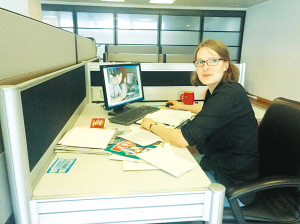 |
| 图为工作中的“德妹”Xenia。(单玉紫枫 摄) |
I came accustomed to my duty stroke and memorized all faces and most names of my colleagues now. Thus my brain is not that overcharged anymore so there is some space to recognize my surrounding and to notice some cultural differences or similarities. 渐渐地,我习惯了我的工作流程,并记住了所有同事的面孔和绝大部分人的名字。因此,我开始有精力来感知我的周围,并注意到一些文化差异及相似之处。 Culture means food. Everybody around me is afraid I wouldn′t like the food, because I′m not used to the meat, the spices or the way to eat with chopsticks. But for me the food doesn′t cause any problems. I think the chinese way to eating is very foreigner friendly because of two reasons. The first reason is, that the food is really, really, really delicious. The second reason is, that even if you don′t like something you can try so many other things, so that you will always find something tasty. In contrast: the canteen of the company I worked for in Germany only offered three different dishes and a big salad per day and you could choose one of those dishes. The four months I worked there I ordered the salad nearly everyday, because the other meals were looking so bad. But in China while having dinner, you can try so many different things, that you have to be a really complicate eater to be not able to like any of those dishes. 饮食即文化。似乎周围的每个人,都担心我会不喜欢这边的菜肴,怕我不习惯吃肉、不习惯菜里作料,以及不习惯用筷子。但事实上,中国饮食没有对我造成任何困扰。我觉得中国的饮食方式,对老外是非常友好的。有两个原因,首先,中国菜真的、真的、真的很好吃。第二个原因就是,(中国菜种类繁多)就算你真的不喜欢其中一些,你还可以尝试很多其他的,所以你总是能发现美味。 与之相反:我在德国实习的公司,餐厅里每天只提供三种不同的菜和一大份沙拉,你只能选择其中的一种。在那里工作的四个月,我几乎每天吃沙拉,因为其他的饭菜看起来让人没有食欲。但在中国吃饭时,你就有很多种选择,能尝试不同的味道,再挑剔的吃货也很难拒绝其中的每一道菜。 Culture also means cultural rules and norms. There are some little things you won′t find in a traveler guide. For example that you may need a tea mug at your working place. But there are also some things, which can cause more uncomfortableness, than a missing mug: I sat in a restaurant with my colleagues, just concentrating on eating with chopsticks and the suddently somebody was coming to clink the glasses. I, in contrast to many other Germans know that it belongs to Chinese culture to clink glasses with the guest one by one. But nevertheless there were lots of questions in my mind: "Should I stand up, or remain seated?", "What shall I say?", "Should I also go and clink glasses with everybody?", "Should I just take a dram or drain my glass?", "What does it mean, that some people are coming to clink once, some not and some two times?". With every clank those questions came to my head again, but the answer didn′t appear. Those things are normal and arise everytime people with a different background meet each other. I know that, but anyhow there always is a little worry about being impolite because of nescience. I hope my eating manner can apologize some mistakes I maybe make for reason of cultural differences! 文化,也意味着约定俗成的规矩。有些小细节旅游指南里不会告诉你,只能亲身经历。例如,在工作场所,你可能需要一个茶杯。但比起没有杯子,还有很多不适应的地方:我和同事集中精力用筷子对付食物,突然就会有人过来碰杯。我与很多德国人都知道宾客轮流碰杯是中国文化。但此时在我的脑海里有许多问题:“我应该站起来,还是坐在座位上?”“我该说什么呢?”“我也要去和大家碰杯吗?”“我应该浅抿一口还是豪爽干杯?”“一顿饭里,有些人过来碰一次杯,有些人却过来碰两次,还有些人根本不碰杯,这都有什么特殊含义么?”每碰一次杯,这些问题就在我脑海里涌现一次,但答案却总是缺席。我知道,不同文化背景的人们相遇总会带来一些不解和困扰,但我也担心因为对当地文化的无知会导致自己有些失礼。 如果我在餐桌上有些举止不当,希望大家能宽容地谅解Xenia这个“老外”! (翻译:孙淼)
|